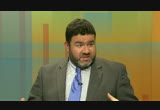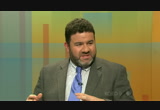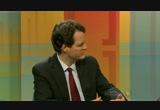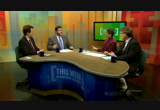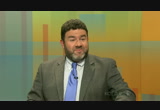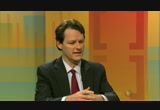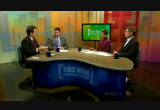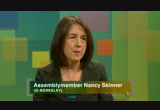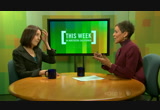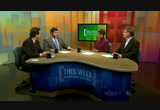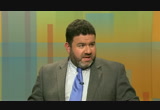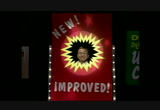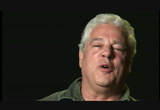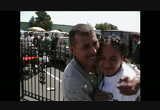tv This Week in Northern California PBS January 11, 2013 7:30pm-8:00pm PST
7:30 pm
welcome to "this week in northern california." i'm valerie coleman morris. joining me on our news panel tonight, paul rogers, environmental writer with the san jose mercury news. michael montgomery for kqed news and center for investigative reporting and josh richman, political reporter with the bay area news group. josh, good news. i mean, so often we have to have bad news when it's talking about money and the state budget. so governor brown has said it is a good news budget. what makes it different from the others that weren't?
7:31 pm
>> well, what makes it different is we have no deficit due to years of budget cuts and due to the new tax revenues we're realizing from voters' approval of proposition 30 in november and essentially as he said, this is a breakthrough. it's not without risks. he was careful to caution. it's only january. this is only the start of the budget process. we all mull it over see how the numbers develop. he puts out his may revision then the legislature starts fight over it and hopefully we have a document enacted by the end of june. we're only at the very beginning. there are a lot of risks along the way. there's a federal deficit that needs to be contended with that can have a lot of impact on the way the state gets and spends its money. the economic recovery is still sort of slow and struggling upward and any reversal on that could spell a change in our state revenues. the federal government or the courts could have a problem with some of the proposed budget cuts that we have made or want to make. it's happened a lot over the last few years.
7:32 pm
and increasing health care costs. you know, are always a factor to be contended with. so at the moment, the news looks good, and i can tell you that this is the first time in all the years i've been on this show when i've done a state budget segment where there was any positive news, practically, whatsoever. >> i don't want to throw any water on that, but historically, budget estimates, aren't they sometimes looked at as just being kind of widely optimistic? >> well, they vary. some are more wildly optimistic than others. i think we'll know more about that. the legislative analyst's office is going to put out its overview of the governor's budget next week. i'll be delving into it more deeply in the weeks to come. what we don't have is a lot of the sort of smoke and mirrors tricks, accounting tricks that were used to balance budgets in past years. not so much under jerry brown, but in recent memory. i won't name me names. this seems to be a bona fide projection. now, there was some raising of
7:33 pm
the eyebrows yesterday because the lao, the legtiislative analyst's office projected we might have a $2 billion deficit that needed to be fixed. jerry brown's budget does not show that. mainly because he's repaying loans from other pots of state money that were used to balance the general fund more slowly than the analysts anticipated and he also anticipates collecting considerably more money from the elimination of the redevelopment agencies we did a couple years ago than the lae contemplated. we'll see how that pans out. >> we have to be careful we're not doing the old every silver lining has a cloud approach here. >> that's true. >> think about it. only three or four years ago, california's budget deficit was $27 billion. >> that's right. >> today it's essentially zero. more or less. and it's going to have surpluses according to the projections over the next three or four years. that is an amazing turnaround. and it seems to me that the main challenge for brown right now is that the democrats in his own party are not going to want to
7:34 pm
spend this newfound surplus on paying down some of the other debt the state has. the so-called wall of debt. the $30 billion brown talked about. they're going to want to spend it on programs they like. is that your sense that he's not going to be fighting republicans so much, because there's so few of them now, but fighting his own party? >> i think that's exactly so. if you listen carefully to what assembly speaker perez and senate president steinberg were saying, they were saying this is great, this is a better starting point than we've had in years, we're ecstatic, but it's a long time until may and, you know, we need to think about things like mental health and dental care and assistance for the elderly and other things like that. there are things they're going to want to tack on to this. jerry brown made it very clear that he sees himself as the stern somewhat frugal parent who's just going to have to say no to a lot of these requests. as hard, though, that may be. >> i want to go back in time, a few months, proposition 30. there was a lot of doom and
7:35 pm
gloom had it not passed. it got 55% of the vote. 65%-45%. had it not passed, knowing what we know today looking at the budget, where would we have been? how bad would it have been? this is more looking at the good news side of things i suppose. how bad would it have been? >> it would have been bad. we'd be looking at deficits. >> $6 billion to $8 billion. >> yes. basically what we have in this budget proposal, what the governor's put forth is essentially $4.1 billion more just to k-12 and higher education. breaks down roughly to about $1 billion to higher ed and $2.7 billion more going in in this forthcoming budget year for k-12. that money and the money that has been, has shored up this year's figures would be gone. it would not be there. and we'd be at the historic low spending that we have had for years. frankly, you know, he's
7:36 pm
contemplating having $2,700 more state funding per student by 2016-2017. we've been on the decline for that for years. we're somewhere down around 4 44t9th in per student state spending. this is going to lift us out of the pit. >> it has potential. people are looking the at this potential and say this could be the real deal but we have to wait to see the real numbers. >> exactly. >> it has been praised by a lot of people. >> from both sides of the aisle. >> both sides. the good news there, there's more good news, right, michael? because as we start looking at what the governor's done, he's making a pretty dramatic announcement, if you will, about the state's prison system. he's basically saying, it's fixed. situation's okay. >> he's saying essentially the crisis is over. the main key problems have been fixed is what the governor said this week in pretty emphatic tones. now, there's two things he's pointing to, and that is the significant population drop in
7:37 pm
the state inmate population. that is, it's gone from 175,000 in 2006 to about 132,000. and you have to take out, you can take out 9,000 from that who are in out of state facilities. that's significant. the other thing the governor was pointing to was significant improvements in medical and mental health care. he pointed to new facilities, increasing in staff capacity. so because of that, what the governor said this week, specifically, is because he said these problems are fixed, the department, the state is taking legal action on two fronts and that is to get the population cap lifted, that the federal courts have imposed on california, that the state is short of that cap. they still have too many inmates according to the courts. and also to get the feds out of the business of the mental health care oversight in the state prison system. they'll still have the health care oversight for now, but the governor said he wants to get rid of that eventually as well.
7:38 pm
to top it all off, he said he'll sign an executive order lifting the state of emergency governor schwarzenegger signed in 2006. that's a lot. >> it's a lot that's going on, and where have they got? i mean, so the state prison may be capped or at least the population is lower, but they've gone to the county and counties are saying that they are overburdened and cannot handle it. >> and this is under the public safety realignment plan which was part of the governor's initiative, and a lot of those inmates have been diverted, people who would have gone to state prison are now in county jails. there is -- he's got to negotiate those politics. the counties are feeling overburdened now with these offe offenders, and, you know, they've got to figure that out. one thing the state's worried about right now is the inmate population decline has stopped. that is it's flat right now. the projections are that the population is going to increase by perhaps a couple of thousand in the coming years. >> and based on what? why are they saying that? >> based on the projections.
7:39 pm
they do projections twice a year, and they look at it pretty closely. and that's what the state's anticipating. one argument is the governor, the governor's asking for the lift in the population cap because they can't get there. and they're worried about the population going up ever so slightly. now, the advocates are saying, look, you know, josh, you talked about smoke and mirrors. advocates are talking about a little bit of smoke and mirrors in terms of the governor. they said he was being a little bit misleading in some details he was using. for example, these medical facilities, some of them haven't been finished yet so you can't say you have additional hospital space for medical if the facilities aren't done yet. also, in terms of staffing, so a lot of these new, you know, clinicians aren't actually in place. so the plaintiffs attorneys and the advocates are saying the cris crisis is not over and the mental and health care is not up to constitutional standards. this will now go to a federal panel of judges to decide whether to consider the state's appeal or legal action and if
7:40 pm
they don't, then the state is going to have to take further actions to reduce the population. >> well, the governor has said it's one of the finest prison systems in the united states. >> if not the world. those were his words. >> really? >> yes, yes. >> so what are his options otherwise? >> so the state was required to submit a plan to reduce the population. it's in state, it's about 119,000 now. they need to get it to 110,000. there's a plan. they filed it under protest. it would involve reducing sentences for some offenders considered low risk. it would essentially release some inmates early. the governor said it's bad policy, we shouldn't do it. he may have to anyway. >> so he's really facing some multiple pressures. >> absolutely, from the counties, from the courts. internal. you talked about that. he said he was kind of walking the middle line here between what he called extreme positions on either side. >> the old paddle on the left, paddle on the right jerry brown school of government. where does sentencing reform fit into this? if we're really going to effect
7:41 pm
prison population, aren't we supposed to be changing why and how we send people to prison? >> that's the concern. the concern is we're just moving people to jail but not really locking up fewer people. advocates at least are talking, and some lawmakers, are talking about more radical sentencing reforms. reducing the length of time people spend in prison. that's the big issue. that's why the court, the prisons have been packed is these long sentences, mandatory minimums and that kind of thing. there is this, you know, nationwide movement of liberals and conservatives to rethink that, with especially drug possession. so we may see more of that and i think, you know, the governor might be open to that. but right now he wants, as he says, the federal courts out of california prisons. >> right now, let's shift, because there was another major story that we saw this week in northern california. it was a massive oil tanker. it came in, it hit one of the bay bridge towers. no big spill at this time. we're grateful. but the environmentalists are really upset about what it could have had and what could have
7:42 pm
happened. you paint a pretty distinct and grim picture with regard to this. i want you to explain to us what the potential was and why environmentalists were so concerned. >> i'm almost happy to be grim when it's warranted. the good news is that thousands of big ships sail around san francisco bay every year, and it's one of the great port cities of the world and they very rarely have accidents. it's pretty safe. the people who sail these ships are very experienced mariners. the local pilots are experts. and occasionally they hit things and it's news. for the most part, they don't. now, you have to sort of step back to get a sense of how big these oil tankers are that come into the bay. and hundreds of them come into the bay every year from valdez, alaska, and other oil ports. they go up the channel, take the oil to contra costa county where they make gasoline for all of our cars. these tankers are as big as the exxon valdez, they're as tall as the skyscrapers in san francisco. so think of the trans-america building turned on its side with
7:43 pm
a steering wheel on it. these ships are as wide as ten lanes of freeway. when you put on the brakes, it takes five miles before they stop. not only that, but there's 12 inches between the bottom of the ship and the bottom of the bay. so if you hit something with a full tanker and it breaks open, in the exxon valdez spill in 1989, 1,300 miles of alaskan coastline were blackened. we all remember the horrible pictures of the otters and everything. it's about 1,300 miles from san diego to seattle. that's how much was destroyed. so can you imagine in san francisco bay, which is small, if one of these breaks open, same amount of oil, it would coat the entire peninsula, the south bay, destroy the wildlife refuges. it would take years of killing thousands of salmon, sea lions, herrens, for that oil to get out because the tidal action is to weak. even though this oil tanker was empty, it's a big deal when an oil tanker hits anything. i mean, it's a career ender for almost all the people involved. >> it could be a huge event if
7:44 pm
the oil tanker had been loaded and had spilled. so, therefore, are we looking now at some safety issues and reconsidering safety issues that haven't been discussed before? do we need to just put more teeth in the ones that are there? >> after every disaster, there are some more reforms put in place. a number of reforms were put in place five years ago after the last time a big ship hit the bridge. in that case, the buson, not an oil tanker, a cargo ship, its fuel tanks ripped open and spilled bunker fuel, 59 miles of shoreline. we put in place a number of reforms to make the area safer. one of those was to say we're going to name nine areas that are risky areas in the bay. bridges like the san rafael bridge or the oakland inner harbor. when the fog is such when you have less than half a mile visibility, sailors are not allowed to sail. now, the coast guard and other maritime officials who wrote those rules left the bay bridge out five years ago. and some people are saying, wait, that's what the busan hit
7:45 pm
in the first place and now a ship hits the same bridge. why wasn't that included in the first place? >> in a few seconds, what, then, will the investigators be looking for? >> well, basically they're trying to see was the pilot under alcohol or drug influence? looks like he wasn't. were there malfunctions on the sheet? were there, you know, weird communications between the coast guard and the ship? was there a language barrier between the crew? based in the philippines. and the local pilot. and they're also looking to reform these rules that i mentioned so that the bay bridge will be included quite probably now in these areas you can't sail when there's low visibility and the fog. >> there are so many things that happen every week in northern california, but all over the country, we realize that this week it is the two-year anniversary of the shooting of congresswoman gabrielle giffords and in the wake of mass shootings in connecticut and in colorado, the obama administration is pushing for new gun safety laws. right here in california,
7:46 pm
several lawmakers have already introduced bills regulating firearms and ammunition sales. one of the latest to do so, assembly member nancy skinner of berkeley who sat down with me earlier to explain how her new bill would help curb gun violence. assembly member nancy skinner. thank you so much for joining us. >> glad to be here. >> just this week near bakersfield, california, taft high school, another shooting. what could your bill ab48 have done in that situation? >> well, the young man who did the shooting had a shotgun that he had to pump, so that's why few people were killed in that incident or shot. if he had used one of these conversion kits and turned his gun into something that could shoot lots of weapons fast, he would have killed many more people. our bill bans those conversion kits. >> ab48, what you are proposing, tell us briefly what you want to do with this bill? >> well right now in california it's easier to buy bullets than it is to buy cigarettes, alcohol, or even sudafed cold medicine. we don't want to make it so easy.
7:47 pm
we'd like some limits on it. we'd like law enforcement to be able to be alerted if you amass huge amounts of rounds of ammunition the way the shooter in golden, colorado, did. or if you're buying it illegally. in other words, if you're the classive person, a convicted felon or certain other classifications where right now you're prohibited, supposedly, from buying ammunition, but we have no way to enforce it. >> if we have no way to enforce it, how will this bill roll out? how can it begin to do the job that you want it to do? >> well, we have lots of safeguards on guns. you want to buy a gun, you have to go to a licensed dealer, show i.d., there's a background check. all those things. anybody can buy bullets anywhere. you don't have to show i.d., and the seller doesn't have to be licensed nor do they have to keep records. what our bill does, ab48, is to put similar kinds of controls as we do on gun sales. >> now, the reality is this isn't brand new. i mean, didn't we have things in
7:48 pm
place that then went away? >> across the entire u.s., we had federal law that existed for over 20 years where if i wanted to sell ammunition, i had to be licensed. if i wanted to buy it, i had to show i.d. records had to be kept. and all those were in place and then the nra sponsored legislation in washington that eliminated that. >> as we look at what is happening, you know, a lot of people are saying, well, here's a solution, we need to put armed guards in our schools. your reaction? >> more guns don't lessen violence. >> some critics of your bill said someone on planning an attack that they could just incrementally buy bullets, a mass amount, and still kind of do the same thing. >> well, they could, and, you know, potentially, there will still be a black market or illegal market on bullets. certainly we know any regulation or law we put in won't eliminate all possibilities, but if we could have some hope of law enforcement being able to
7:49 pm
enforce the prohibitions we now have, or that limit on if i'm enraged and i can just on an impulse buy lots of bullets and then i might act on it, whereas if i had to take a little more time or go out of my way and go to a licensed dealer, maybe i've calmed down in the interim, so maybe i don't -- i'm not in a situation where i'm a mass shooter. so as much as we can try to minimize these kinds of, the reaction and the ability for people to easily get bullets. >> you had multiple points. one is that what your bill is doing is really returning the country to a law that had been a national law. two, you want more scrutiny. and then preventing this impulse buy. >> yes. >> that, to me, is very interesting because that gets into the whole idea of mental illness as well. >> right. >> it's not necessarily only impulse buying, but people who may be mentally ill who have access to guns that are legally in their home. >> well, and right now, we have
7:50 pm
existing prohibitions on if you've had certain mental health conditions, you're not supposed to be able to buy bullets. but how would the seller of the bullet know that? because they don't have to check your i.d. there's no records. so at least if we had some of these things in place, if a person who had the kind of background that is prohibited from buying ammunition, law enforcement is able to know and they can intervene. >> oftentimes people have said, you know, across the country, we could do better if we were orchestrated, if we had a way that everybody could know how many bullets are sold. how many guns are out there. but there are backlogs for all of these things. what would ab48 do? >> well, we have a registry now, the department of justice has a registry of all gun sales. this would create a registry of bullet sales the same way we have with gun sales so law enforcement would have access. >> a lot of people when we're talking about gun control, they say, but the second amendment says the right to bear arms. you're saying but the second amendment also says something else. >> yes, we do have the right to bear arms but it also states the words explicitly in the second amendment are "highly regulated." >> assembly member skinner.
7:51 pm
thank you so much for this. i appreciate it. ab48. and we will follow. >> you're welcome. >> assembly member skinner is just one of many legislators across the country responding to the public outcry over gun violence. so, josh, i mean, what happens? what do we do? this is going to be an uphill battle. >> it's definitely going to be an uphill battle, and assembly woman skinner is among the first to acknowledge that. there are a lot of people who are not so much into that well-regulated militia. it's not actually highly regulated. it's well-regulated. as assembly woman skinner would have it. i think she's going to have problems not only from the republican parts of the legislature, but also from suburban and rural democrats and even possibly some other democrats as well who are just not going to buy into this for fear of the gun lobby, for fear of constituents who are sportsmen who don't believe that this is an effective way of addressing the problem. it's going to be a tough sell. >> okay. that is on our state level. on the national level, let me
7:52 pm
quote, vice president biden saying, i want to make it clear, we are not getting caught up in the notion that unless we can do everything, we're going to do nothing. does this suggest already that they know that there's going to be a continuing battle on this? they're trying to put something on the table that says we can have -- >> i think "the new york times" article today summed it up pretty well. the white house knows it's going to be very hard to get an assault weapons ban of the kind senator feinstein is imposing through the house of representatives and through the senate as well. they don't want to set that as the only possible bar of success. they're going to be looking for other things they can do, perhaps through congress, perhaps through executive order, dealing with things like importation of weapons from overseas and so on and so forth. to get something on the scoreboard here as a response that will have some sort of effect on the gun culture in america. >> well, i would like to thank you all very much. as always. the conversation is good, and tonight i'd like to thank my
7:53 pm
guests and to thank you at home for joining us as well. but in closing tonight, belva davis remembers colleague and former "this week in northern california producer" john froner. he passed away last week after a battle with cancer. >> john was the most constant person i ever knew. he remained true to his beliefs and he had no tolerance for injustice. he was there to support workers' rights wherever there were grievances. john produced award-winning children's programs at kron where we both worked before coming to kqed. here he worked on a variety of programs including "this week in northern california" for more than a decade. as well as quest and specials like "the durst amendment" and documentaries like "no turning back" which won a national emmy. we were both proud of a segment about california's three-strikes sentencing law, with exculusive
7:54 pm
interviews with inmates at soledad prison. and john's final segment for kqed in 2011 was about singer and civil rights activist jimmy. he was a talented singer, songwriter and musician in his own right. his most recent cd "going to take us all" speaks to john's deepest belief. as we say good-bye, we share a bit of it with you now. ♪
7:59 pm
gwen: shape shifting, at the pentagon and treasury, with afghanistan and on gun policy. more than meets the eye, tonight on washington week. >> there's an unofficial saying over at treasury -- "no peacocks, no jerks, no whiners." that would be a good saying for all of washington gwen: the president begins to fill out his second term cabinet. how do these men fit his second term vision? chuck hagel, his pick for the pentagon -- >> mr. president i'm grateful for this opportunity to serve our country again, and especially its men and women in uniform and their families. gwen: jack lew, the choice for treasury -- >> as a kid growing up in queens, i had dreams of making a difference in the world. gwen: john brennan at the c.i.a., and john kerry at state. key advisers whose actions could define the obama legacy. plus, tackling two prickly issues -- u.s. involvement in plus, tackling two prickly issues -- u.s. involvement in afghanistan --
161 Views
IN COLLECTIONS
KQED (PBS) Television Archive
Television Archive  Television Archive News Search Service
Television Archive News Search Service 
Uploaded by TV Archive on

 Live Music Archive
Live Music Archive Librivox Free Audio
Librivox Free Audio Metropolitan Museum
Metropolitan Museum Cleveland Museum of Art
Cleveland Museum of Art Internet Arcade
Internet Arcade Console Living Room
Console Living Room Books to Borrow
Books to Borrow Open Library
Open Library TV News
TV News Understanding 9/11
Understanding 9/11

